Fleurs du Mal Magazine


Or see the index
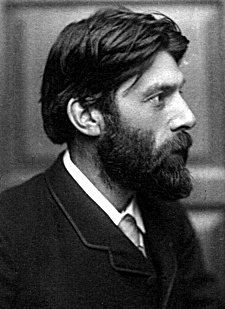
Robert Bridges
I have loved flowers that fade,
Within whose magic tents
Rich hues have marriage made
With sweet unmemoried scents:
A honeymoon delight,
A joy of love at sight,
That ages in an hour
My song be like a flower!.
I have loved airs that die
Before their charm is writ
Along a liquid sky
Trembling to welcome it.
Notes, that with pulse of fire
Proclaim the spirit’s desire,
Then die, and are nowhere
My song be like an air!.
Die, song, die like a breath,
And wither as a bloom;
Fear not a flowery death,
Dread not an airy tomb!
Fly with delight, fly hence!
‘Twas thine love’s tender sense
To feast; now on thy bier
Beauty shall shed a tear.
Robert Seymour Bridges (1844 – 1930)
I have loved flowers that fade
fleursdumal.nl magazine
More in: Archive A-B, Bridges, Robert
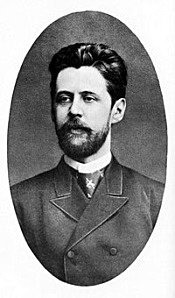
Innokenti Annenski
(1855–1909)
Van de sterren …
Van de sterren glinsterend en stil
is er één die ik van naam goed ken,
niet omdat ik van haar houden wil,
maar bij andere steeds droevig ben.
Als ik mij in twijfel tot haar richt,
vraag ik háár naar wat er nodig is,
niet omdat zij dan de nacht verlicht,
maar bij haar het licht niet nodig is.
Innokenti Annenski, Среди миров, 1901
Vertaling Paul Bezembinder, 2017
Paul Bezembinder: zijn gedichten en vertalingen verschenen in verschillende (online) literaire tijdschriften. Zie meer op zijn website: www.paulbezembinder.nl
fleursdumal.nl magazine
More in: Annenski, Annenski, Innokenti, Archive A-B
Who hasn’t heard of Proust’s famous questionnaire? The writer’s answers have travelled across time and all around the world, but people have forgotten that they came from an album called Confessions that belonged to Antoinette Faure, daughter of the future French President.
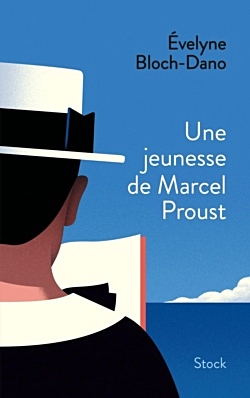 Marcel Proust didn’t realize that, by taking part in what was a fashionable parlour game, he would be revealing clues about his teenage self. His answers have elicited commentaries but have never been contextualised or compared, never dated accurately.
Marcel Proust didn’t realize that, by taking part in what was a fashionable parlour game, he would be revealing clues about his teenage self. His answers have elicited commentaries but have never been contextualised or compared, never dated accurately.
Where and when did he answer this questionnaire? What sort of boy was he at the time? And most significantly, how much of that period and those friendships fed into his future work? What traces are left of Gilberte on the Champs-Élysées, Albertine’s little group and the “young girls in flower”?
Évelyne Bloch-Dano conducted this enquiry over many years. Using sometimes tiny clues, she managed to identify Antoinette’s other friends, some of whom may have known Proust.
A whole world came to life, revolving around the daughters of the late nineteenth-century bourgeoisie, many of them with connections to Le Havre like the Faure family. Some boys appear too. Through their ideas, their books, their customs, what they study and what they dream of, the portrait of a whole generation emerges.
Marcel Proust’s generation. Young people born to the defeat at Sedan in 1870, in a vengeful republican France. The generation of General Boulanger, of political scandal and the Dreyfus Affair, but also of schools for girls, electricity, Great Exhibitions and the Belle époque. And later the First World War.
The biographer and essayist Évelyne Bloch-Dano is the author of several prize-winning and widely translated books, including most notably biographies of Madame Zola (1997, Grand Prix of Elle readers), Madame Proust (2004, Prix Renaudot for an essay), Le Dernier Amour de George Sand (2010), but also Jardins de papier (2015), and the more personal La Biographe (2007) and Porte de Champerret (2013).
Evelyne Bloch-Dano: Une jeunesse de Marcel Proust
(Marcel Proust as a young man by Évelyne Bloch-Dano)
Collection: La Bleue
Éditions Stock Paris
Parution: 20/09/2017
304 pages
Format: 135 x 215 mm
EAN: 9782234075696
Prix: €19.50
fleursdumal.nl magazine
More in: Archive A-B, Art & Literature News, BIOGRAPHY, FDM in Paris, Marcel Proust, Proust, Marcel
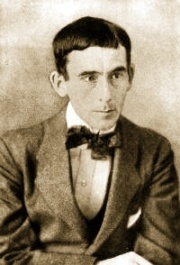
Wolken
elomen elomen lefitalominal
wolminuscaio
baumbala bunga
acycam glastula feirofim flinsi
elominuscula pluplubasch
rallalalaio
endremin saxassa flumen flobollala
feilobasch falljada follidi
flumbasch
cerobadadrada
gragluda gligloda glodasch
gluglamen gloglada gleroda glandridi
elomen elomen lefitalominai
wolminuscaio
baumbala bunga
acycam glastala feirofim blisti
elominuscula pluplusch
rallabataio
Hugo Ball
(1886-1927)
Wolken
fleursdumal.nl magazine
More in: Archive A-B, Ball, Hugo, Dada, DADA, Dadaïsme
De avond is ongemak is het schrijnende verhaal van een religieus boerengezin dat wordt getroffen door de dood van een kind.
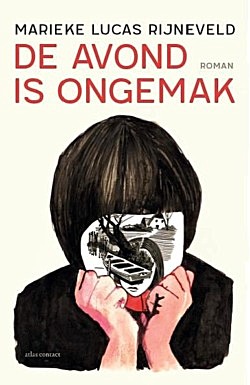 Matthies komt op een dag niet meer terug van het schaatsen en laat zijn zusje Jas in totale verwarring achter. Door de ogen van de dertienjarige Jas zien we hoe de familieleden elk op hun eigen manier omgaan met het verlies. Vader en moeder zijn volledig verlamd door verdriet en zien niet hoe Jas en haar zusje Hanna en haar broer Obbe ondertussen langzaam ontsporen. Onder leiding van Obbe ondernemen ze morbide experimenten met dieren en Hanna en Jas dromen hartstochtelijk van een Redder, een man als Boudewijn de Groot, een man die hen mee kan nemen naar de Overkant en hen in kan wijden in de geheimen van hun seksualiteit.
Matthies komt op een dag niet meer terug van het schaatsen en laat zijn zusje Jas in totale verwarring achter. Door de ogen van de dertienjarige Jas zien we hoe de familieleden elk op hun eigen manier omgaan met het verlies. Vader en moeder zijn volledig verlamd door verdriet en zien niet hoe Jas en haar zusje Hanna en haar broer Obbe ondertussen langzaam ontsporen. Onder leiding van Obbe ondernemen ze morbide experimenten met dieren en Hanna en Jas dromen hartstochtelijk van een Redder, een man als Boudewijn de Groot, een man die hen mee kan nemen naar de Overkant en hen in kan wijden in de geheimen van hun seksualiteit.
Marieke Lucas Rijneveld romandebuut: De avond is ongemak
Dit boek wordt uitgeleverd vanaf 17 januari 2018.
Marieke Lucas Rijneveld (1991) geldt als een van de grootste talenten van de Nederlandse letteren. In 2015 debuteerde ze met de meermaals herdrukte dichtbundel Kalfsvlies, die werd bekroond met de C. Buddingh’ Prijs voor het beste poëziedebuut. In de Volkskrant werd ze vervolgens uitgeroepen tot literair talent van het jaar. Haar indrukwekkende voordracht was veelvuldig te horen op literaire podia als Crossing Border, De Jonge Schrijversavond en de Nacht van de Poëzie, en haar gedichten en verhalen verschenen in een groot aantal literaire tijdschriften, waaronder Hollands Maandblad, VPRO Gids en De Revisor. Rijneveld groeide op in een gereformeerd boerengezin in Noord-Brabant en woont tegenwoordig in Utrecht, de stad die haar in 2015 het C.C.S. Cronestipendium toekende. Naast haar bestaan als schrijver werkt ze op een melkveebedrijf.
Marieke Lucas Rijneveld:
De avond is ongemak
Uitgever: Atlas Contact
Pagina’s 256
Paperback – € 19,99
ISBN 9789025444112
Verschijningsdatum 17 jan. 2018
fleursdumal.nl magazine
More in: - Book News, - Book Stories, Archive Q-R, Archive Q-R, Art & Literature News, Rijneveld, Marieke Lucas
De dichtersline-up van de 35ste Nacht van de Poëzie op zaterdag 16 september 2017 in TivoliVredenburg in Utrecht is compleet!

Met Astrid Lampe, Marije Langelaar en Jaap Robben komt het aantal dichters van deze jubileumeditie op een totaal van 19. De bekendmaking van de entr’actes volgt op een later moment.
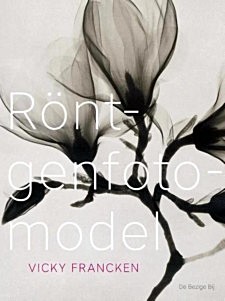 Eerder al werd bekend dat Simone Atangana Bekono, Abdelkader Benali, Jan Boerstoel, Vicky Francken, Max Greyson, Jonathan Griffioen, Frank Koenegracht, Antjie Krog, Carmien Michels, Neeltje Maria Min, Bart Moeyaert, Cees Nooteboom, Idwer de la Parra, Alexis de Roode, Runa Svetlikova en Dimitri Verhulst het fameuze podium van TivoliVredenburg betreden tijdens de jubileumeditie van de Nacht.
Eerder al werd bekend dat Simone Atangana Bekono, Abdelkader Benali, Jan Boerstoel, Vicky Francken, Max Greyson, Jonathan Griffioen, Frank Koenegracht, Antjie Krog, Carmien Michels, Neeltje Maria Min, Bart Moeyaert, Cees Nooteboom, Idwer de la Parra, Alexis de Roode, Runa Svetlikova en Dimitri Verhulst het fameuze podium van TivoliVredenburg betreden tijdens de jubileumeditie van de Nacht.
De presentatie van de Nacht van de Poëzie is ook dit jaar in handen van Piet Piryns en Ester Naomi Perquin, die eerder dit jaar werd benoemd tot Dichter des Vaderlands. Speciaal vanwege de 35ste verjaardag wordt de Nacht van de Poëzie dit jaar uitgebreid met een KinderNacht. Tijdens deze middag voorafgaand aan de grote Nacht dragen Bibi Dumon Tak, Diet Groothuis, Koos Meinderts, Bart Moeyaert, Ester Naomi Perquin en Jaap Robben voor.
Een Circus van Poëzie, Muziek en puur lichamelijke Acrobatiek: dat is de structuur die schuilgaat achter dit grootschalige evenement. Zo ongeveer: muziek – dichter – dichter – muziek – dichter – dichter – dichter – acrobatiek – enz. enz.’ Zo werd de allereerste Nacht van de Poëzie in 1980 aangekondigd. In 2017 beleeft het inmiddels grootste poëziefestival van Nederland alweer zijn 35ste editie!
 16 september 2017, 20:00
16 september 2017, 20:00
Grote Zaal TivoliVredenburg, Vredenburgkade 11, Utrecht
Entree €36,00 – €15,50
Met Cees Nooteboom, Antjie Krog, Bart Moeyaert, Jonathan Griffioen, Neeltje Maria Min, Dimitri Verhulst, Simone Atangana Bekono, Abdelkader Benali, Frank Koenegracht, Jan Boerstoel, Alexis de Roode, Vicky Francken, Carmien Michels, Runa Svetlikova, Max Greyson, Idwer de la Parra, Astrid Lampe, Marije Langelaar en Jaap Robben
Presentatie: Piet Piryns en Ester Naomi Perquin
Entr’actes: Brigitte Kaandorp
Goed om te weten: de ‘Nacht’ duurt van 20.00 tot ±03.00, maar je bent vrij om te komen en te gaan wanneer je wilt.
# meer info http://www.nachtvandepoezie.nl/

De jaarlijkse Nacht van de Poëzie wordt dit jaar uitgebreid met een ‘KinderNacht’. Op de middag voorafgaand aan de ‘grote’ Nacht kunnen kinderen samen met hun ouders, familie en vriendjes in TivoliVredenburg komen luisteren naar griezelige gedichten en raadselachtige rijmpjes.
KinderNacht van de Poëzie
Voor alle poëziefans vanaf zes jaar
16 september 2017, 15.00 – 16.15 uur
TivoliVredenburg, Vredenburgkade 11, Utrecht
Entree €9,50
Met Koos Meinderts, Diet Groothuis, Jaap Robben, Bart Moeyaert, Bibi Dumon Tak en Ester Naomi Perquin
# meer info http://www.kindernacht.nl/
fleursdumal.nl magazine
More in: Antjie Krog, Art & Literature News, Cees Nooteboom, Literary Events, MODERN POETRY, MUSIC, Nacht van de Poëzie

Picasso’s bicycle
The clutter was busy with itself,
dusty, rusty bits of calloused iron
struggled in the dinosaur maxim
of becoming dead skeletons
at the end of a so-so utilitarian life.
The effeminate ballroom
was not far behind, peeling
paint and whimpering plaster
on stained alabaster flooring,
the dream of luxury expiring.
The ghost of a danced waltz
in a Fin de Siècle stench spewed
to the vibration of tuneless strings.
Cobweb filled champagne bottles
sipped by drunk working class guests,
parched their sandy mouths thirsty.
The dirt filled the building slowly
travelling illegally on the back
of the Sirocco from the Levant
to leave an arid skin on every surface.
The walls bleached and blistered,
the fascias cracked and crumbled,
the Republic surrendered easily
to the upstart Spaniard’s charms
and chivvied slices of glory for him
in the ruined hypocrisy of its noblesse.
His work attested to a fall in standards
in slices of past glory, all ideas stolen
by the old devil’s goat-like desires.
The scrapyard sniggered in contempt
at the old fool, and the camera stared.
03.02.11
Vincent Berquez
Vincent Berquez is a London–based artist and poet
fleursdumal.nl magazine
More in: Archive A-B, Berquez, Vincent, Pablo Picasso, Vincent Berquez
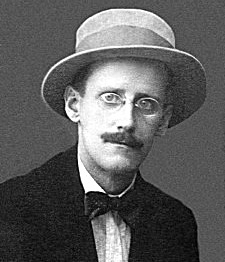
Flood
Goldbrown upon the sated flood
The rockvine clusters lift and sway;
Vast wings above the lambent waters brood
Of sullen day.
A waste of waters ruthlessly
Sways and uplifts its weedy mane
Where brooding day stares down upon the sea
In dull disdain.
Uplift and sway, O golden vine,
Your clustered fruits to love’s full flood,
Lambent and vast and ruthless as is thine
Incertitude!
James Joyce (1882 – 1941)
Flood
fleursdumal.nl magazine
More in: Archive I-J, Joyce, James, Joyce, James
A literary retrospective of a crucial period in modernism—the transition from Dada to Surrealism––via portraits and encounters with its literary lions, including Joyce, Proust, Reverdy, Apollinaire, Crevel and more by the co-founder of the Paris surrealist group.
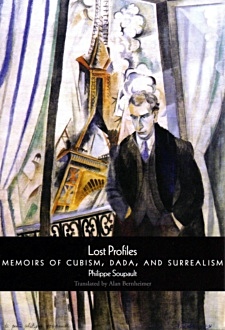 Poet Alan Bernheimer provides a long overdue English translation of this French literary classic—Lost Profiles is a retrospective of a crucial period in modernism, written by co-founder of the Surrealist Movement.
Poet Alan Bernheimer provides a long overdue English translation of this French literary classic—Lost Profiles is a retrospective of a crucial period in modernism, written by co-founder of the Surrealist Movement.
Opening with a reminiscence of the international Dada movement in the late 1910s and its transformation into the beginnings of surrealism, Lost Profiles then proceeds to usher its readers into encounters with a variety of literary lions.
We meet an elegant Marcel Proust, renting five adjoining rooms at an expensive hotel to “contain” the silence needed to produce Remembrance of Things Past; an exhausted James Joyce putting himself through grueling translation sessions for Finnegans Wake; and an enigmatic Apollinaire in search of the ultimate objet trouvé.
Soupault sketches lively portraits of surrealist precursors like Pierre Reverdy and Blaise Cendrars, a moving account of his tragic fellow surrealist René Crevel, and the story of his unlikely friendship with right-wing anti-Vichy critic George Bernanos.
The collection ends with essays on two modernist forerunners, Charles Baudelaire and Henri Rousseau. With an afterword by Ron Padgett recounting his meeting with Soupault in the mid 70’s and a preface by André Breton biographer Mark Polizzotti, Lost Profiles confirms Soupault’s place in the vanguard of twentieth-century literature.
Philippe Soupault (1897-1990) served in the French army during WWI and subsequently joined the Dada movement. In 1919, he collaborated with André Breton on the automatic text Les Champs magnétiques, launching the surrealist movement. In the years that followed, he wrote novels and journalism, directed Radio Tunis in Tunisia, and worked for UNESCO.
Lost Profiles
Memoirs of Cubism, Dada, and Surrealism
Philippe Soupault
Translated by Alan Bernheimer
Foreword by Mark Polizzotti
Afterword by Ron Padgett
Paperback – $13.95
Pages:112 – 2016
City Lights Publishers
ISBN978-0-87286-727-7
“(…) a brief account by a perceptive writer who was on the scene when modernity was young.”, Robert Fulford
fleursdumal.nl magazine
More in: - Book News, - Book Stories, Archive S-T, Art & Literature News, Art Criticism, Cendrars, Blaise, DADA, Dadaïsme, EXPERIMENTAL POETRY, EXPRESSIONISM, DADA & DE STIJL, SURREALISM, Kubisme, SURREALISM, Surrealisme

Haikoe
Voor de bomen blij
ben ik dat het weer regent
en er achter ook
Bert Bevers
Uit: Onaangepaste tijden,
Zinderend, Bergen op Zoom, 2006
Bert Bevers is a poet and writer who lives and works in Antwerp (Be)
fleursdumal.nl magazine
More in: Archive A-B, Bevers, Bert
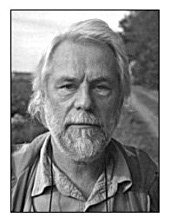
Ton van Reen
Het gras is van hem
Alle gras dat hij ziet is van hem
alle gras waar zijn oog op valt eigent hij zich toe
het gras tussen de stenen aan zijn voeten
het gras dat van steen naar steen kruipt
verder en verder
zo ver zijn oog reikt is alle gras van hem
Alles neemt hij
de hele grazige wereld die hij voor zich ziet
alle gras binnen zijn blikveld is van hem
Waar hij is, waar hij gaat is het gras van hem
hij hoort het zachte zuchten van zijn gras
Hij ruikt het ochtendgras
bewasemd door dauw
het groene gras dat zijn oog overweldigt
Ton van Reen: Het gras is van hem
Uit: De naam van het mes. Afrikaanse gedichten
fleursdumal.nl magazine
More in: Archive Q-R, Natural history, Reen, Ton van, Reen, Ton van, Ton van Reen

Verse ohne Worte
gadji beri bimba glandridi laula lonni cadori
gadjama gramma berida bimbala glandri galassassa laulitalomini
gadji beri bin blassa glassala laula lonni cadorsu sassala bim
gadjama tuffm i zimzalla binban gligla wowolimai bin beri ban
o katalominai rhinozerossola hopsamen laulitalomini hoooo
gadjama rhinozerossola hopsamen
bluku terullala blaulala loooo
zimzim urullala zimzim urullala zimzim zanzibar zimzalla zam
elifantolim brussala bulomen brussala bulomen tromtata
velo da bang bang affalo purzamai affalo purzamai lengado tor
gadjama bimbalo glandridi glassala zingtata pimpalo ögrögöööö
viola laxato viola zimbrabim viola uli paluji malooo
tuffm im zimbrabim negramai bumbalo negramai bumbalo tuffm i zim
gadjama bimbala oo beri gadjama gaga di gadjama affalo pinx
gaga di bumbalo bumbalo gadjamen
gaga di bling blong
gaga blung
Hugo Ball
(1886-1927)
Verse ohne Worte
fleursdumal.nl magazine
More in: Archive A-B, Ball, Hugo, Dada, DADA, Dadaïsme
Thank you for reading Fleurs du Mal - magazine for art & literature